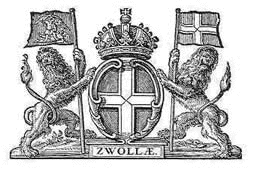


The mail connection between Denmark and Northern Netherlands usually went via the Stadtpost Hamburg.

Map of Denmark, 1823.
The Danish rate lists were in Lybske skilling (L.Sk.), but the payment had to be in Riksbankskilling (RBS).
In 1834 the possibilities were:
- franco to Hamburg: Danish domestic rate of 1818.
- franco to the Dutch Border Post Office Deventer: Danish domestic rate to Hamburg + 7 L.Sk / 22 RBS (up to and including ½ Lod).
- postage paid to destination in the Netherlands: Danish domestic rate to Hamburg + 10 L.Sk / 32 RBS (up to and including ½ Lod).
The rates between Hamburg and Copenhagen were:
for 1 sheet of paper weighing up to |
currency |
rate |
|
28-09-1799 |
1 lod |
L.Sk |
6 |
01-05-1801 |
1 lod |
L.Sk. |
7 |
01-07-1809 |
¾ lod |
L.Sk. |
8 |
01-01-1812 |
1 lod |
L.Sk. |
12 |
01-02-1813 |
1 lod |
RBS |
39 |
01-08-1818 |
1 lod |
RBS silver |
29 |
01-07-1838 |
¾ lod |
RBS silver |
29 |
The Danish postal rates for letters to and from the Netherlands were from 1 April 1851:
weight |
Danish share in skilling |
Prussian share |
Netherlands share in cent |
total in skilling |
ditto, loose mail |
|
01-04-1851 |
1 lod |
13 *) |
3 |
10 *) |
34 *) |
|
15-07-1854 |
1 lod |
9 *) |
3 |
10 *) |
30 *) |
|
01-07-1864 |
1 lod |
9 |
2 |
5 |
22 |
|
01-08-1865 |
1 lod |
4 / 6 |
2 / 2⅔ |
5 |
17 / 22 **) |
|
01-04-1867 |
3 qvint |
14 / 21 **) |
17 |
|||
01-05-1868 |
3 qvint |
13 |
||||
01-11-1868 |
3 qvint |
10 / 20 **) |
*) Up to 1-1-1864: For the area up to and including 30 km from the Dutch-German border: 4 skilling less. From 1854 to 1864 for the area in Holstein and Lauenburg up to 75 km from Hamburg: 5 skilling less.
**) rate for sent prepaid / received unfranked.
Rate per private steamer to the Netherlands: 15 skilling per lod.
Conversion currencies: 6 cent = 4,2667 Skilling = 1 German Silbergroschen.
When converting Silbergroschen into cents, the Netherlands rounded up to five cents, except for 1 Silbergroschen, which was rounded down to five cents.
Danish weights: 1 lod = 15,325 grams. 1 qvint = 5 grams.

Circular 1867 No 8.
The mail to the Netherlands had to be sent with the Korsør - Kiel Dampfskibspostexpedition (circular 8/1867).
From 1 January 1870 the rates were in øre. The rate to the Netherlands became 20 øre per 3 kvint (40 øre for unfranked letters received from the Netherlands).

Envelope from Fredericia via Hamburg (cds on reverse) to Zwolle, 8 February 1867. Rates 0 - 15 grams: share for Germany 2 Sgr + share for the Netherlands (5 cents =) 1 Sgr = 3 Silbergroschen (bottom left indicated in red) + share for Denmark 4 Skilling = 17 skilling. The foreign share 13 skilling is also indicated in blue on reverse. German handstamp FRANCO. Franked with 3 x 3 + 2 x 4 skilling 1864 issue.
The Dutch rate from 1 December 1815 for a letter from or to Denmark, to Hamburg, up to 1 Lood (from 1-1-1829 up to 16 wigtjes) was 10 stuivers. From 1-1-1827: 35 cents and from 1-2-1852 to 15 wigtjes: 30 cents (for destinations in the Netherlands up to and including 30 km from the border: 25 cents).
The Dutch rates for letters between the Netherlands and Denmark were from 1 April 1851:
via |
wigtjes |
Netherlands share in cents |
Prussian share in Sgr |
Danish share in Sgr |
total in cents |
|
01-04-1851 |
Hamburg |
15 |
10 *) |
2 |
3 *) |
50 *) |
Netherlands + Prussian share in cents |
||||||
15-02-1864 |
Warnemünde - Ystad |
15 |
20 / 25 **)
|
4½ |
50 / 55 **) |
|
01-04-1864 |
Lübeck - Malmö |
15 |
20 / 25 **)
|
2 |
35 / 40 **) |
|
Prussian + Danish share in Sgr |
||||||
01-08-1865 |
Prussia |
15 |
5 |
3 / 4
|
25 / 30 **) |
|
01-04-1867 |
closed mail |
15 |
20 / 30 **) |
|||
01-11-1868 |
closed mail |
15 |
15 / 30 **) |
|||
*) Up to 1-1-1864: For the area up to and including 30 km from the Dutch-German border: 4 cents less. From 1854 to 1864 for the area in Holstein and Lauenburg up to 75 km from Hamburg: 1 Silbergroschen = rounded off 5 cents less.
**) rate for sent prepaid / received unfranked.
Last update 12.02.2026 2:53 PM
Copyright © 2019 -
G.L. van Welie FRPSL
Secretary of the Nederlandse Academie voor Filatelie
Representative of the Royal Philatelic Society London for the Netherlands
Nothing from this website may be copied, distributed and / or published without written permission from the author.